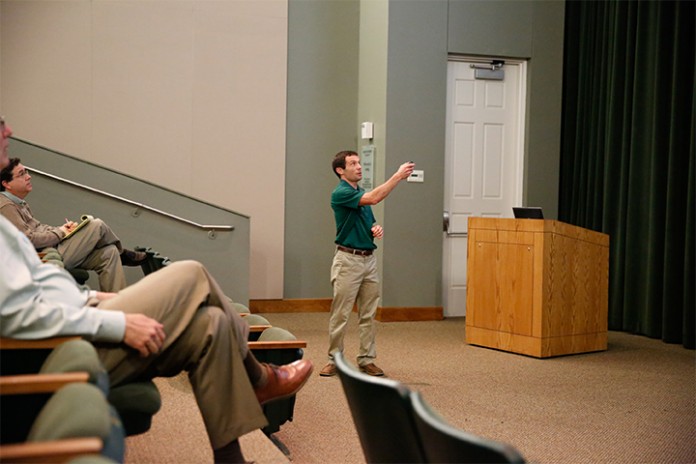
For about a year now, the physics department at Baylor has teamed up with the Mayborn Museum to host Science Thursdays, a series of one-hour talks on various scientific topics. Audience members need no science background, only enthusiasm for and an open interest in science.
Dr. William Hockaday from the department of geosciences spoke at 7 p.m. last Thursday over the topic of “Carbon negative chemicals and fuel for the fight against climate change.”
Hockaday spoke to an audience of undergraduate and graduate students, as well as faculty and staff, about how the process of biomass pyrolysis can contribute significantly to carbon storage, renewable fuels and green chemicals.
“The topic affected me a lot,” said Ph.D. student Bulbul Ahmmed. “We are facing dire consequences due to climate change and this speaker is going to give us a solution that can meet the challenge.”
Hockaday explained his process for biomass pyrolysis that he created, essentially, out of his garage. Hockaday said his process can be used on a grander scale and can help with the effects of carbon emission from the soil.
“A lot of the lectures that I’ve heard before about climate change are kind of depressing and talk about how insurmountable these problems are, but I felt like this talk was a little more hopeful, and Dr. Hockaday actually presented a solution that is viable and could actually be implemented in the next few years before things get too out of hand,” said Poteet sophomore Kassidy Woytek.
When asked why he chose to attend this Science Thursday, geology graduate student Bill Lukens said he came because he knew Hockaday personally. “I study soil, as well, and climate change, so it’s a topic I am actively interested in.”
Woytek said she has been to previous Science Thursdays. “I am in the course Natural World, and we have to do two outside learning opportunities, and I wanted to come to this because the topic is interesting to me.”
Lukens said he enjoyed seeing the audience’s response to the topic. “The interface between the science we do and the public is very interesting to see how it plays out, and I like to see other people’s reactions to it as well.”
After the presentation was complete, there was a question-and-answer session with Hockaday. Many of the audience members sparked discussions about the growth of Hockaday’s method and where it could go in the future.
“I think it’s a real promising method that Dr. Hockaday spoke about on terms of carbon storage possibilities, and right now we don’t have too many viable options, and this seems like a real exciting one,” Lukens said. “It leaves me dismayed at the future of climate change but positive and optimistic at where we can go to try and mitigate the problem.”
Science Thursday will resume next week, and will be presented by Dr. Lorin Matthews, Associate professor of physics, over the topic of “How to build a solar system.”
The website encourages people to attend the lecture to learn about the process of planet formation and the possibility of another life-supporting planet.
On April 14, Science Thursday will feature “When Blue Water Turns Green,” presented by Dr. Owen Lind, professor of biology.
All Science Thursdays are free. Light refreshments of cookies and coffee are served before the lectures.





